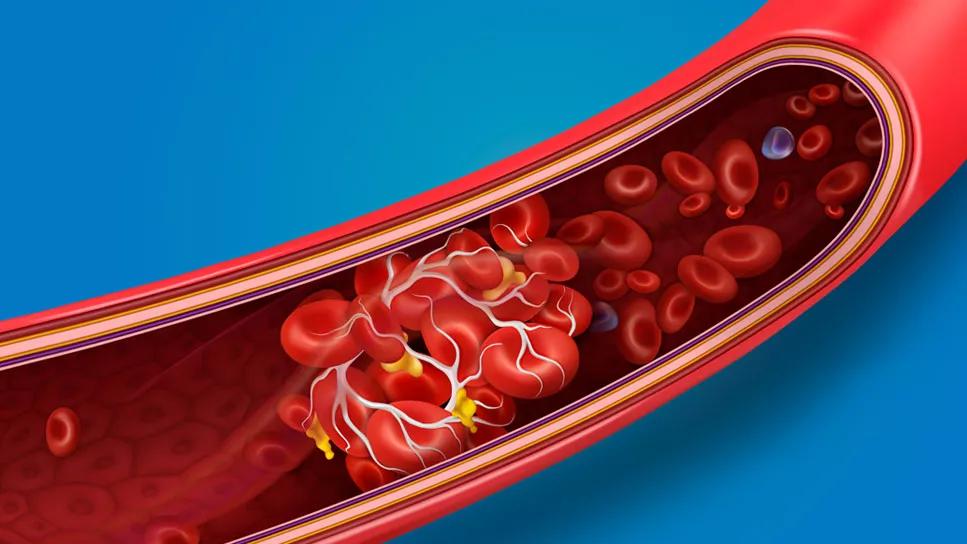Consortium aims to reduce life-threatening side effect of therapy

The National Heart, Lung and Blood Institute (NHLBI), part of the National Institutes of Health, awarded a $4.7 million grant to Cleveland Clinic to study the prevention of life-threatening, cancer-associated thrombosis.
Advertisement
Cleveland Clinic is a non-profit academic medical center. Advertising on our site helps support our mission. We do not endorse non-Cleveland Clinic products or services. Policy
The new funding will support a Cleveland Clinic-led research consortium, which will focus on developing strategies to prevent cancer-associated thrombosis.
The five-year grant, led by Keith McCrae, MD, and Alok Khorana, MD, supports the creation of a new risk assessment tool to better predict which cancer patients will develop blood clots during treatment. The project, led by Cleveland Clinic’s Taussig Cancer Institute and Lerner Research Institute, will coordinate a consortium of three sites involved in this NHLBI program. Other sites include Beth Israel Deaconess Medical Center (Harvard Medical School) and the University of Cincinnati.
“About 20 percent of cancer patients develop blood clots, which can cause stroke, hospitalization and delays in treatment. In fact, cancer-associated thrombosis is the second leading cause of death in patients with cancer,” says Dr. Khorana, Director of the Gastrointestinal Malignancies Program at Cleveland Clinic Cancer Center. “This grant will help us address the challenge of identifying who will develop blood clots and enable us to treat them proactively with blood thinners to prevent this complication.”
The study will incorporate data from more than 5,000 patients with colorectal, lung and pancreatic cancer enrolled in clinical trials at various research centers. Researchers will use this robust biobank to identify coagulation-related and genetic biomarkers associated with abnormal blood clotting. They will build on research that suggests that activation of a specific blood-clotting pathway may contribute to thrombosis, and that biomarkers related to that pathway may identify patients at particularly high risk of blood clots before they happen.
Advertisement
The team ultimately plans to synthesize this data to develop a comprehensive risk calculator by incorporating the identified biomarkers and statistical modeling. The online risk assessment tool would be available for clinical use.
“Cancer-associated blood clots are a critical clinical problem, and we urgently need better ways to predict which patients are at greatest risk,” says Dr. McCrae, Director of Hematology. “This NHLBI grant will provide new information that will greatly improve the management of patients with cancer, arming physicians with an advanced statistical tool to better identify who may develop this common and harmful side effect.”
The new grant builds upon important work initiated through Cleveland Clinic’s Center of Excellence in Cancer Thrombosis Research, which focuses on novel approaches to the management and prevention of cancer-associated thrombosis. Since its establishment in 2016, a multidisciplinary team of researchers across Cleveland Clinic, with collaborators at Case Western Reserve University, have worked together to study the efficacy of novel therapies, develop new preclinical models, and create and expand biorepositories. Dr. Khorana’s work is supported by the Sondra and Stephen Hardis Chair in Oncology Research.
Advertisement
Advertisement

Early results show strong clinical benefit rates

The shifting role of cell therapy and steroids in the relapsed/refractory setting

Radiation therapy helped shrink hand nodules and improve functionality

Standard of care is linked to better outcomes, but disease recurrence and other risk factors often drive alternative approaches

Phase 1 study demonstrates immune response in three quarters of patients with triple-negative breast cancer

Multidisciplinary teams bring pathological and clinical expertise

Genetic variants exist irrespective of family history or other contributing factors

Study shows significantly reduced risk of mortality and disease complications in patients receiving GLP-1 agonists